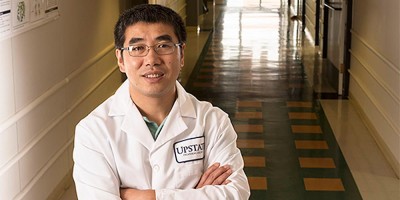Upstate Researcher Awarded $3.2 Million Grant to Develop Breakthrough Treatment for Battlefield Injuries and Combat Sepsis and ARDS
Juntao Luo, PhD, was awarded a $3.2 million grant from US Army Medical Research to develop a treatment for battlefield injuries to prevent sepsis and acute respiratory distress syndrome (ARDS). The control of both infection and hyperinflammation during early emergency treatment is critical to saving the lives of soldiers with traumatic/blast injuries. Luo and his team are working on a two-pronged approach to provide both immediate treatment on the field and ongoing care easily provided at battlefield hospitals. The project team consists of experts in nanotechnology, pharmacology, microbiology, immunology, and clinical sepsis treatment.

Juntao Luo, PhD, was awarded a $3.2 million grant from US Army Medical Research to develop a treatment for battlefield injuries to prevent sepsis and acute respiratory distress syndrome (ARDS).
Injuries resulting from events such as blast trauma or abdominal trauma can lead to conditions like sepsis and ARDS due to hyperinflammation. No effective treatment is currently available for sepsis should antibiotics fail. The mortality rate for sepsis, especially with ARDS, remains high at about 18-50%.
The aim of this project is to develop innovative approaches to emergency care that can effectively control both infection and hyperinflammation. “If you can control both, they have a better chance of survival,” says Luo.
Hyperinflammation occurs when the body's immune response goes into overdrive, resulting in a "cytokine storm" that can lead to multiple organ damage and severe illness.
“If at the local site, you see redness, swelling, and pain, that’s OK,” Luo explains. “But if too much of those cytokines are released into the body and they cause systemic inflammation, then it can cause the liver, kidney or lung to become inflamed as well.”
“This whole grant is about providing care at different stages of a severe injury,” says Luo. The first part is to develop an injectable nanotrap so that soldiers or others can directly administer it to the site of a severe injury.
Luo says that right now, on the battlefield they are mostly focused on managing pain and controlling bleeding. “As I understand, there is no effective approach to manage inflammation and infection at the same time. You can use a steroid drug to suppress inflammation and suppress the immune system, but steroids can raise the risk of infection.” An injectable nanotrap can be directly administered on-site right after the injury to absorb damaged molecules and cytokines.
The second prong of this project is to develop a hemoperfusion device that plugs into a standard blood filtration system commonly available in military field hospitals and community hospitals. “By passing the patient’s blood through this column, then feeding it back into circulation, we can neutralize the inflammatory mediators in the blood to help prevent organ failure.”
While this project is currently in the pre-clinical phase, Luo says he is highly motivated to translate this idea into the real world. “It generally takes many years to translate a technology into clinical and battlefield applications. This PRMRP Technology/Therapeutic Development Award (TTDA) provides support to further optimize the prototype products, evaluate the efficacy in higher animal models, and validate the efficacy in human specimens. These studies provide strong evidence for the next step Phase-II TTDA awards application, or to directly attract venture and pharmaceutical industries for further pre-clinical studies to enable clinical tests."
If successful, this approach could significantly improve the outcomes of individuals facing life-threatening conditions due to traumatic injuries and infections in both military and civilian life. The innovative approaches and the multidisciplinary nature of the team at the Upstate Sepsis Interdisciplinary Research Center (SIRC) make this project a promising avenue for advancing emergency medical care.
"Dr. Cooney, the Chairman of Surgery at Upstate is a key collaborator of the project," says Luo. "In addition to being an experienced trauma Surgeon and surgical intensivist, Dr Cooney is also an established surgical scientist with overlapping research interests in sepsis and organ failure." He works closely with Dr. Luo on several projects as Co-Director of Upstate SIRC.
Luo is a 2022 SUNY TAF award winner for his work on injectable nanomedicine to treat sepsis and ARDS. You can read more about his work here- https://www.upstate.edu/pharm/faculty.php?empID=luoj